Makerere University College of Humanities and Social Sciences on 6th November 2025 joined the rest of the world to celebrate the Global Ethics Day under the theme, “Ethics Revisioned: The Role of Ethics in the Promotion of Good Governance in Uganda.”
The event held at the Frank Kalimuzo Central Teaching Facility 1 was organized by students from the Department of Philosophy under their Guild Representative Council (GRC) and the Ethics Association.
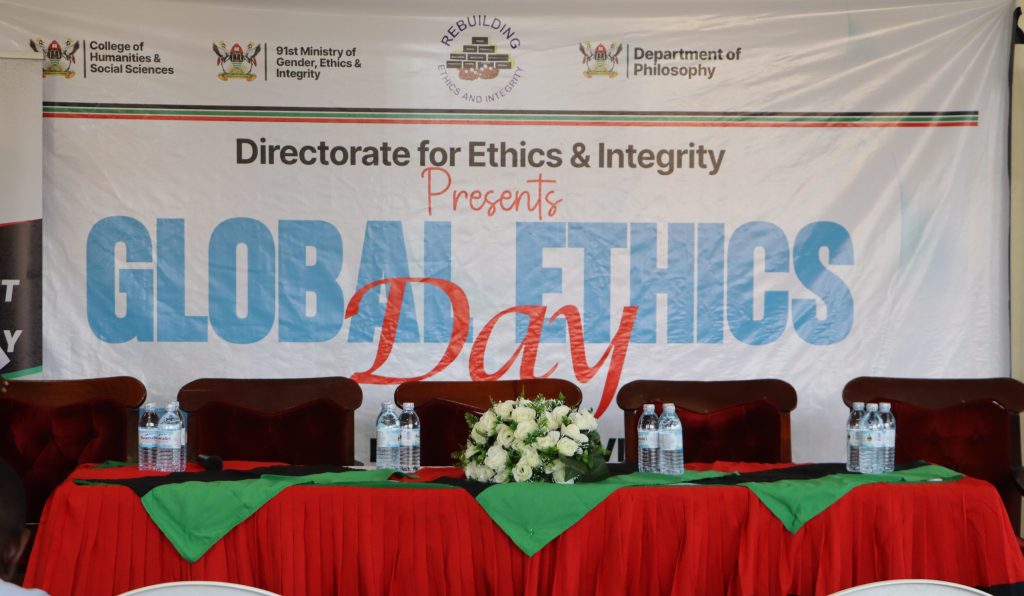
Moderated by Kenneth Kauta, Principal Ethics Officer at the Network for Ethics and Integrity, attracted academics, students and senior government officials from the Directorate of Ethics and Integrity who reflected on the role of ethics in good governance and national transformation. The discussion centered on the declining moral standards in governance and society.
Former Ethics Minister Nsaba Buturo Warns Uganda Risks Collapse Without Moral Renewal
Former Minister for Ethics and Integrity and current Chairperson of the Parliamentary Ethics Forum, Hon. Dr. Nsaba Buturo, warned that Uganda faces moral decay and potential instability unless urgent steps are taken to restore ethical and moral values at both individual and institutional levels.
Dr. Buturo cautioned that Uganda’s moral and ethical foundations were “being eaten away,” warning that without decisive action, the country risked “conditions of lawlessness, exploitation, and underdevelopment.”
“Ethics is the oxygen of this nation,” Dr. Buturo emphasized. “When you take it away, the country suffocates. We are ignoring what really makes nations tick.”
He lamented the lack of investment in ethics and morality, noting that the budget for ethical programs had been reduced instead of strengthened. He argued that the absence of ethical values was a root cause of corruption, poor governance, and weak institutions.
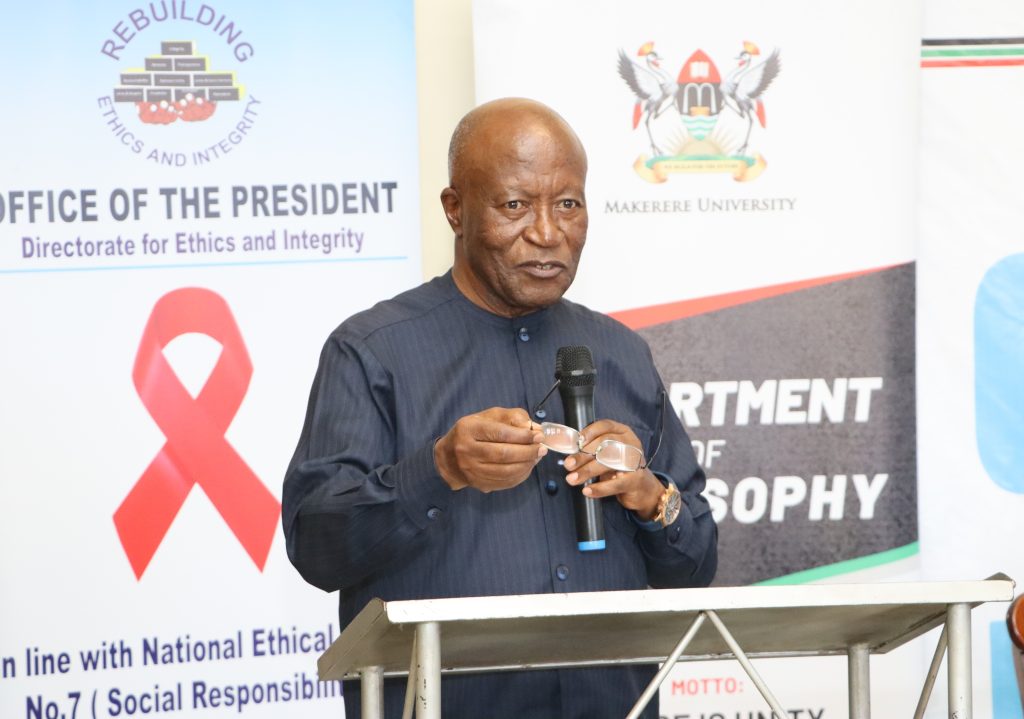
Drawing comparisons with more developed countries, Dr. Buturo said that the major difference between prosperous and struggling nations lay in their moral discipline and respect for ethical standards.
“Where ethics are strong, nations prosper. Where ethics are weak, nations collapse,” he said, calling for government and civil society to prioritize moral education and ethical governance.
Dr. Buturo also challenged the government to make Global Ethics Day a nationally recognized observance, saying that discussions on ethics and good governance were “the oxygen of national survival” but were often ignored.
Quoting Nelson Mandela, he reminded students that destroying a nation does not require weapons but the erosion of educational and moral standards. He added, however, that the root problem was not poor education but ethical failure, asserting that “the decision to cheat, to steal, or to exploit is an ethical question.”
The former minister stressed that ethics are integral to good governance, defining it as leadership characterized by transparency, accountability, participation, and respect for the rule of law.
He urged Uganda to integrate ethics into its development strategy, noting that while investments in physical infrastructure were visible, moral infrastructure was being neglected.
“Uganda can only rise and shine when ethics and good governance become the backbone of our national development,” he concluded.
Government Urges Youth to Uphold Integrity as Uganda Targets Tenfold Economic Growth
The Government of Uganda called on young people and public institutions to prioritize integrity, accountability, and moral discipline as key drivers of national development, warning that economic growth targets will remain unattainable without a strong ethical foundation.
Delivering remarks on behalf of the Permanent Secretary in the Directorate for Ethics and Integrity, Mr. Joel Wanjala, the Under Secretary for Finance and Administration, said Uganda’s ambitious plan to achieve tenfold economic growth hinges on “restoring public sector ethics and nurturing a generation of leaders with integrity.”
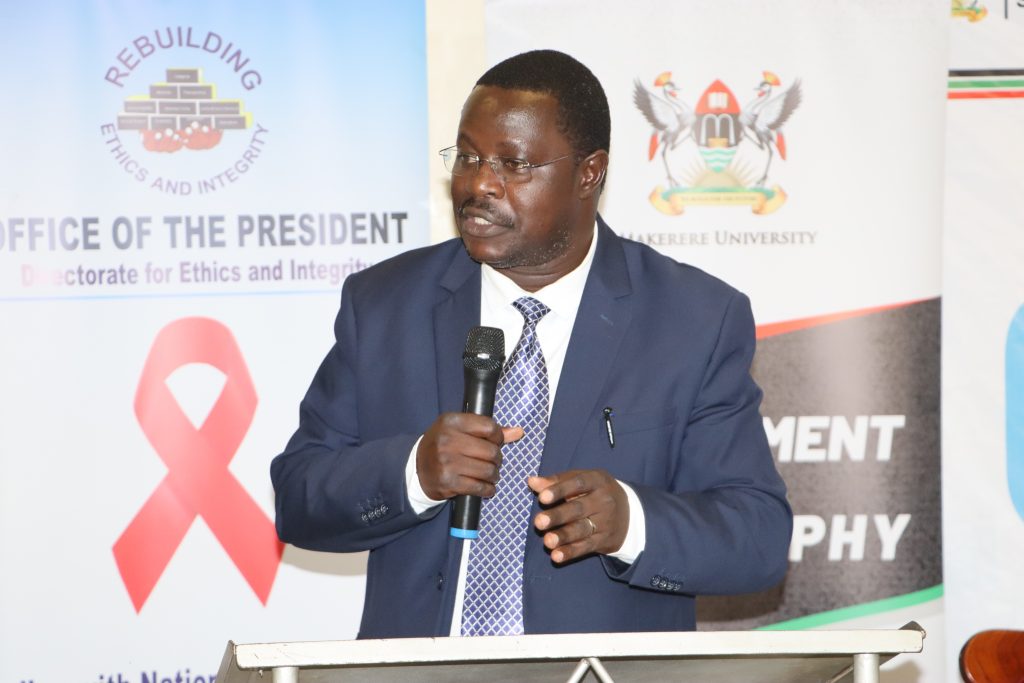
Wanjala commended Makerere University for partnering with government to train ethical leaders, saying the institution remained “a seedbed” for future public servants.
“You, the students, are the future we shall recruit from. That is why we are partnering with Makerere — to nurture a good breed of ethical officials in government,” Wanjala told participants.
He emphasized that Uganda’s path to prosperity required moral transformation as much as economic policy, noting that “Uganda is a rich country, but what we lack is the critical mass of human resources with integrity.”
According to Wanjala, the Directorate for Ethics and Integrity which has operated for 27 years continues to spearhead national efforts to rebuild ethics and fight corruption through mindset change, transparency, and accountability initiatives.
He cited a series of laws and policies underpinning the country’s anti-corruption framework, including the Leadership Code Act, theAnti-Corruption Act, theInspectorate of Government Act, and theWhistleblower Protection Act. He also mentioned ongoing reviews of the National Risk Coverage Policy (2013)and implementation of theZero Tolerance to Corruption Policy (2019).
“If we are to achieve our Vision 2040 goals, we must go beyond legislation and restore the moral fabric of our society,” he said. “Ethics must be mainstreamed in every institution if we are to transform Uganda.”
Wanjala highlighted the government’s economic targets raising Uganda’s economy from USD 65 billion to USD 150 billion and increasing average household income fromUGX 190,000 to UGX 500,000 per monthby 2030. However, he cautioned that without ethical governance, these goals could be derailed.
“You can design the best programs and visions, but if the people managing them lack integrity, they will collapse,” he warned.
Concluding his address, Wanjala urged students to “live as ethical persons” and remember that the choices they make between right and wrong define not only their character but the nation’s destiny.
“Never take anything for granted,” he said. “What you learn here will be tested when you serve your country. We must all do the right things, transparently and accountably.”
“Ethics Must Be Lived, Not Just Taught” — Principal CHUSS, Assoc. Prof. Helen Nambalirwa Nkabala
Representing the Vice Chancellor, Assoc. Prof. Helen Nambalirwa Nkabala, Principal of CHUSS, officially opened the conference and welcomed participants. She praised the students and faculty for their initiative, saying the day was a testament to Makerere’s commitment to nurturing morally grounded leaders.
“What you see in this room today is a clear example of what our students can do when guided and mentored. Ethics is not just a subject we teach — it is something lived,” she said.
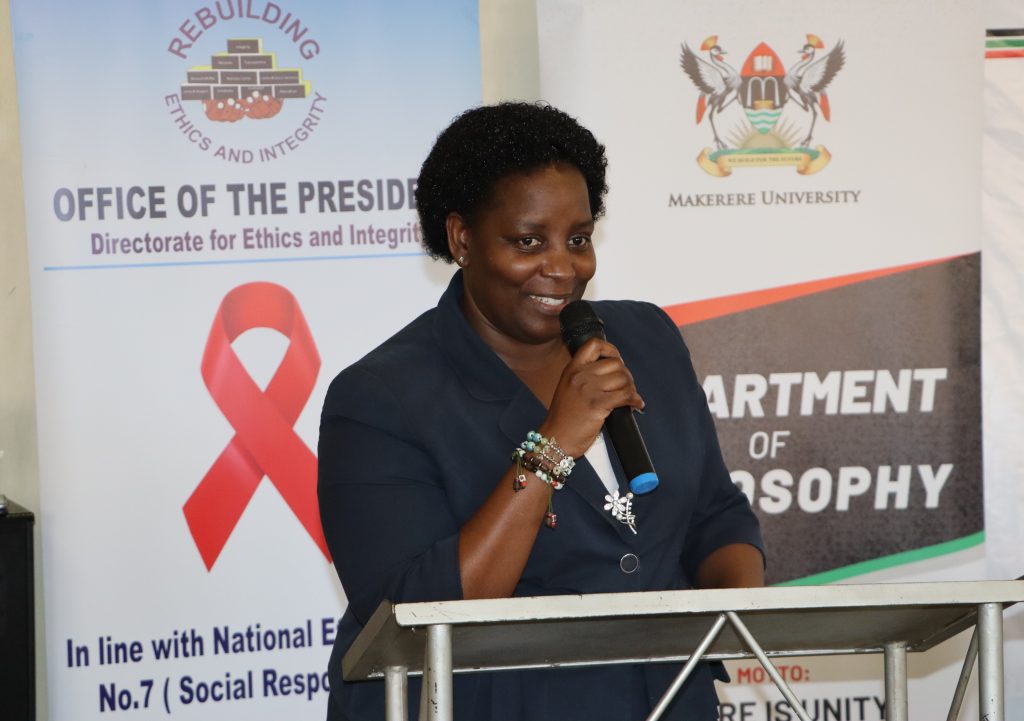
Prof. Nkabala reflected on the need to “re-envision ethics” in the modern, digital era, where information spreads rapidly and influences values differently from the past.
“We are no longer in the days we grew up in. The kind of information students access today is not what we accessed before. That is why we must recenter ourselves and think critically about where we are and where we are going,” she said.
A scholar of biblical ethics, Nkabala drew from her academic background to underscore that ethical values are cultivated through upbringing and practice, not imposed externally.
“Ethics nurtures us; it shapes who we become. If we fail to cultivate ethics within ourselves, there is no way we can stand before others and call them to be ethical,” she stated.
She lamented that the humanities and social sciences — disciplines that teach reflection, values, and critical thought — have been sidelined, yet they remain essential to building a morally responsible society.
“We, in the humanities, are the soul and the heart of this university,” she said. “Without us, this world cannot be. We are the bridge between science and society, because if science is made without ethics, society cannot receive it ethically.”
Prof. Nkabala thanked the Directorate of Ethics and Integrity and Makerere’s partners for supporting the event and declared the workshop officially open on behalf of the Vice Chancellor.
“Ethics Begins with the Individual” — Dr. Pamela Khanakwa, Dean, School of Liberal and Performing Arts
Dr. Pamela Khanakwa, Dean of the School of Liberal and Performing Arts, commended the Department of Philosophy and students for spearheading the Global Ethics Day celebrations. She noted that ethics is not merely an academic discussion but a daily practice that begins with each person.
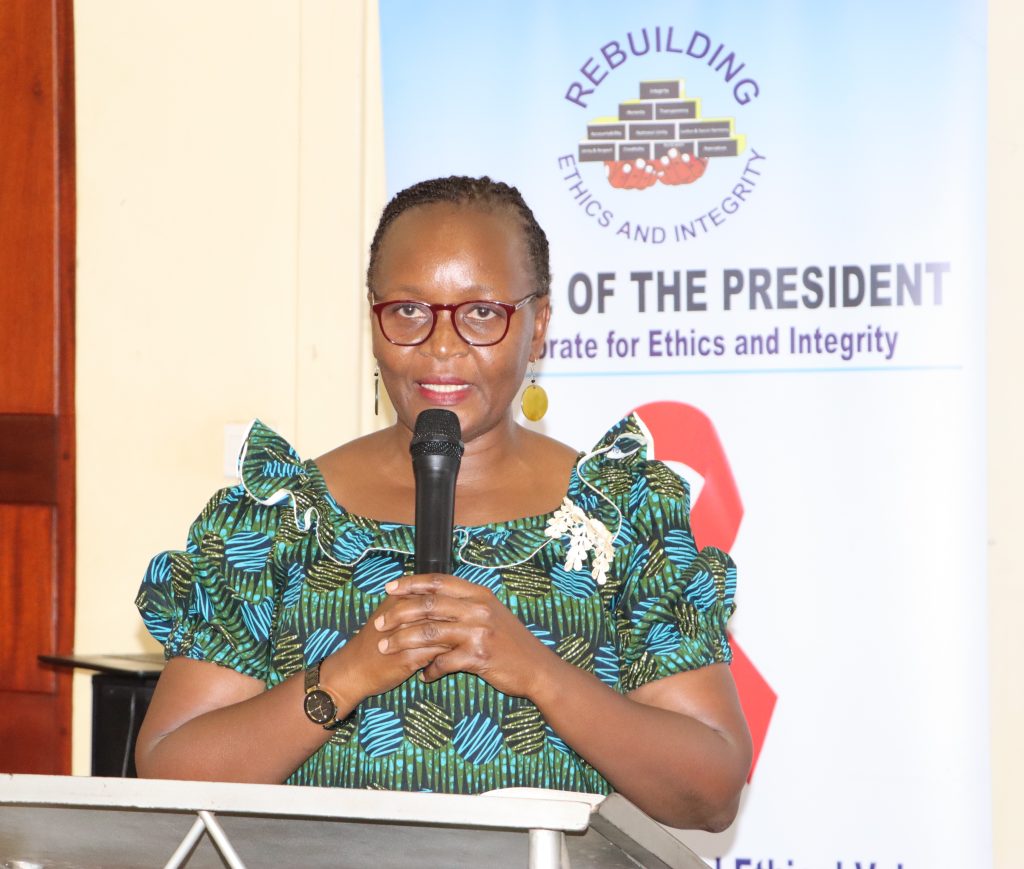
“Ethics and integrity begin with you as an individual,” Dr. Khanakwa said. “Before we talk about systems and governance, we must first look inward. Ethics is personal before it becomes public.”
She emphasized that small personal actions — such as keeping public spaces clean or respecting others’ rights — are the foundation of national integrity.
“Do we need police to tell us not to litter? How many times do we do things that are not good for humanity or coexistence?” she asked. “If each of us acted responsibly, we would make the world a better place.”
Dr. Khanakwa also applauded students for their engagement despite academic pressures, saying their participation reflected a growing sense of awareness among the youth about moral and governance issues.
“Our students have shown they are interested in what is going on in their country. Ethics is not about exams — it is about character, responsibility, and the kind of citizens we become,” she said.
She concluded by urging the audience to reflect deeply on their moral choices and to cultivate integrity in all aspects of life.
“Rebuilding Ethics Requires a Whole-Society Effort” — Dr. Dickson Kanakulya, Head, Department of Philosophy
Dr. Dickson Kanakulya, Head of the Department of Philosophy, explained the significance of Global Ethics Day, which was initiated by the Carnegie Council for Ethics in International Affairs to promote moral reflection in public and private life.
Kanakulya described the event as a moment of collective introspection, reminding society of the need to uphold moral standards that hold communities together.
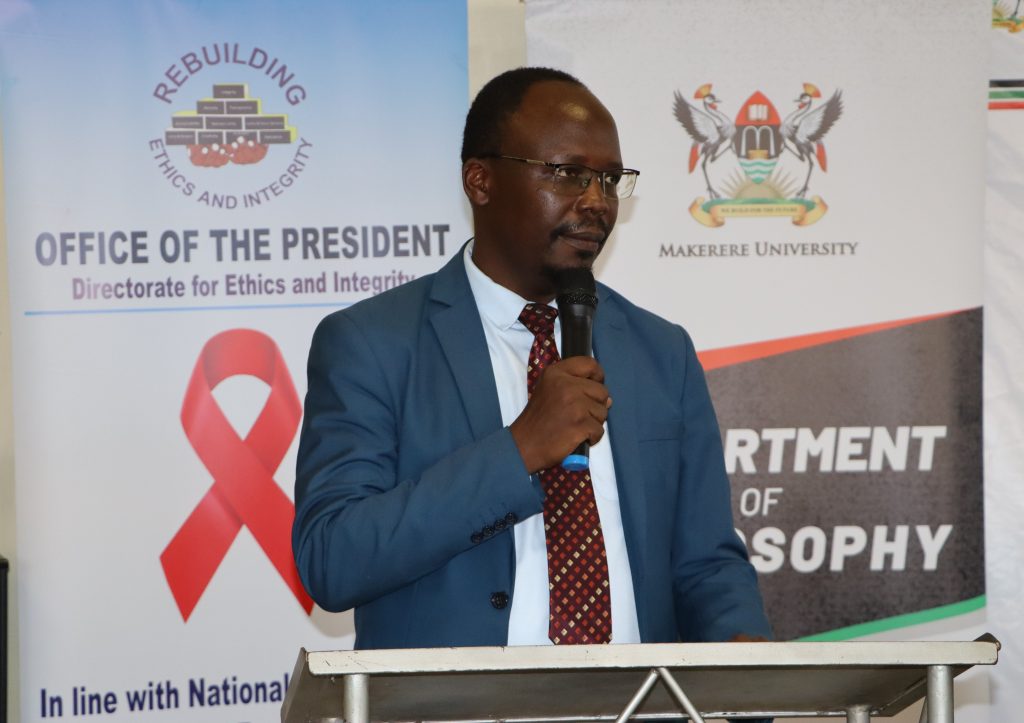
“One of the challenges the world faces today is the collapse of the moral fabric that keeps society together,” he said. “For any society to stand, we must agree on certain moral standards — the normal ways to behave.”
He likened ethics and integrity to navigational tools guiding a ship through turbulent seas, saying nations require moral discipline and mental clarity to steer toward prosperity.
“Good governance, like a skilled captain, demands people of discipline and clarity. Ethics helps us know where we are going, while integrity keeps us disciplined on that course,” he explained.
Citing Uganda’s Vision 2040, Dr. Kanakulya warned that the country’s progress could be derailed if ethical standards are ignored. He illustrated the impact of corruption with an example of a dishonest official inflating tree-planting figures — an act that undermines environmental and developmental goals.
“If the person entrusted to plant five million trees plants only 50,000 and reports otherwise, the damage is far greater than financial loss. It is an ethical failure,” he said.
He concluded that rebuilding ethics cannot be done in isolation, urging all sectors to work together.
“Rebuilding ethics and integrity is a whole-society approach. We must act collectively to restore the moral fabric that keeps our society together,” he stated.
“Integrity Is the Foundation of Leadership” — Hon. Comfort Keinembabazi, 91st Guild Minister for Gender, Ethics and Integrity
Representing the student leadership, Hon. Comfort Keinembabazi, Makerere’s 91st Guild Minister for Gender, Ethics and Integrity, called on young people to embrace ethical values as a cornerstone of leadership and citizenship.
“As young leaders and citizens, we carry a great responsibility not only to talk about ethics but to live them in our daily decisions,” she said.
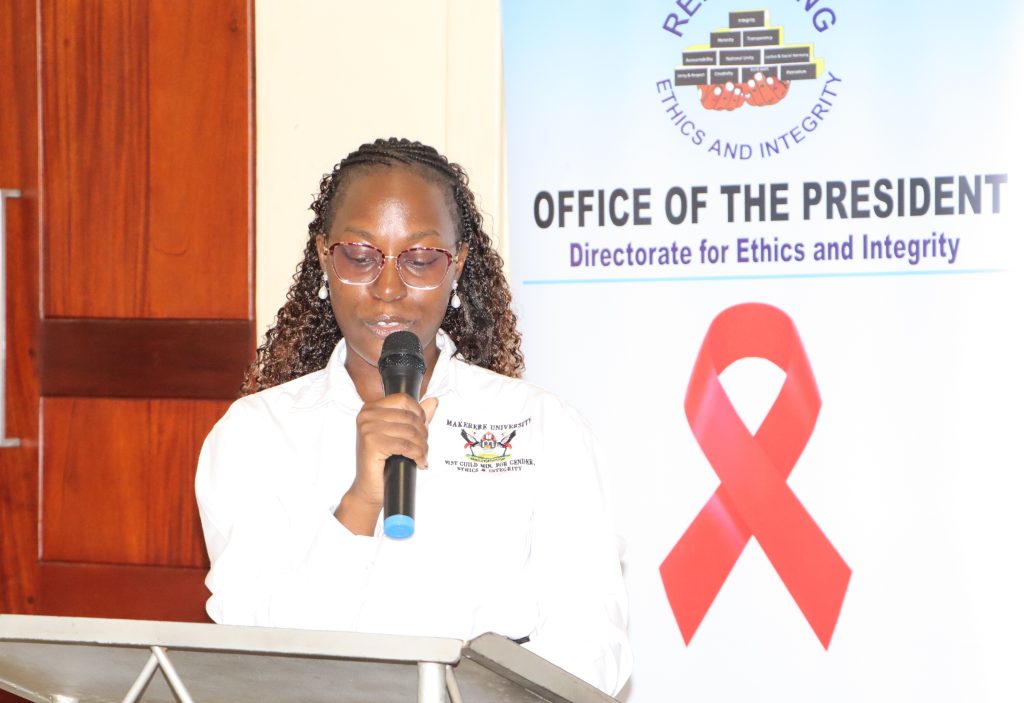
Keinembabazi emphasized that good governance is built from the bottom up, beginning with the attitudes and actions of individuals.
“Good governance begins with the choices we make — how we lead, how we serve, and how we treat the people around us,” she added.
She urged her peers to integrate ethics into all areas of life — in classrooms, workplaces, and communities — as a culture rather than a mere ideal.
“Integrity is not just a principle for public officers; it is a culture we must live with. When ethics thrive, good governance flourishes,” she concluded.
“Let’s Strive for a Uganda of the Common Good” — Hon. Manzi Victor
In his welcoming remarks, Hon. Manzi Victor, Guild Representative Councilor for the School of Liberal and Performing Arts (SLPA) and Chairperson of the Makerere Ethics Association, urged students to take personal responsibility in building an ethical Uganda grounded in respect for the common good.
“The Uganda we strive for is one where all of us can enjoy a good life — and we can only enjoy that if we respect ethics at the highest level,” he said.
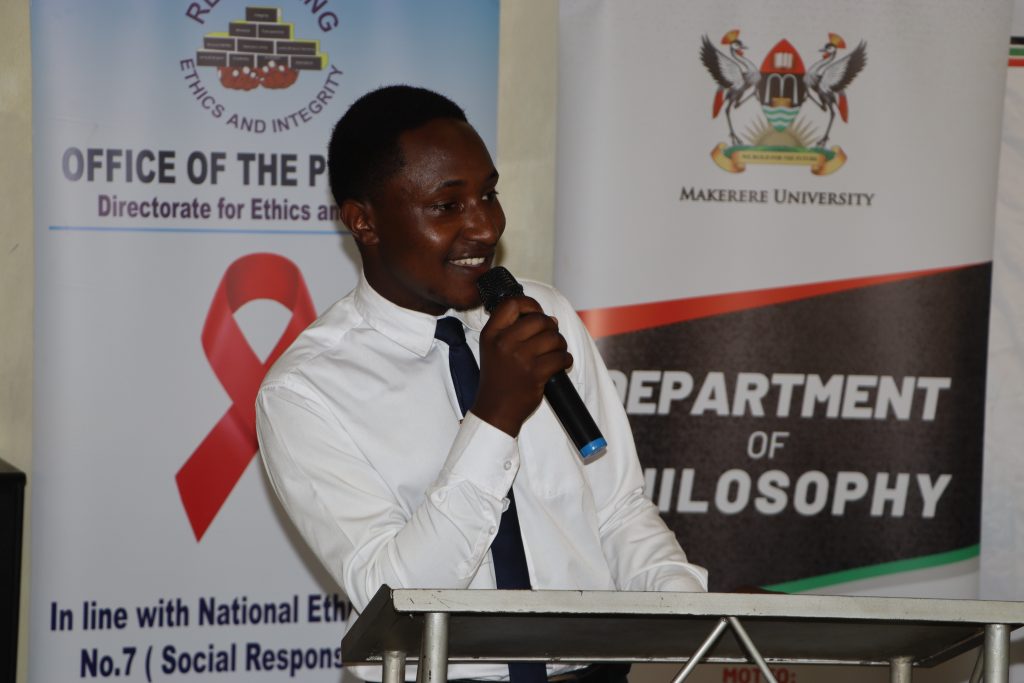
Manzi reminded both leaders and citizens that ethical living begins with individual choices and consideration for others.
“If we aim to build a society where we are not selfish, where we prioritize our neighbors, and where we wish for others what we wish for ourselves, that is the society worth living in,” he added.
He encouraged participants to carry the message of integrity beyond the event, saying, “Even after here, go on and spread the message of being ethical and moving with integrity.”
Global Ethics Day is an annual event observed on the third Wednesday of October to promote ethical practices in both organizations and individuals across the globe. Created by the Carnegie Council for Ethics in International Affairs, it encourages discussion and action on ethics in various sectors, including business, government, education, and the environment. The day serves as a reminder of the importance of ethical standards in decision-making and maintaining public trust.
Ethics Begins with Self-Accountability, Says Prof. Eric Awich Ochen
While closing the event, Assoc. Prof. Eric Awich urged students to uphold integrity and accountability as foundations for good governance. Prof. Eric Awich challenged university students to embrace self-accountability as the cornerstone of ethical behavior and national development.
Awich underscored the importance of personal responsibility in promoting integrity and good governance. “Accountability starts with the self,” he said. “Before you are accountable to others, you must first learn to be accountable to yourself.”
He explained that self-accountability extends to managing one’s life responsibly, especially for students living independently for the first time. “Many of you were under strict supervision from your parents before joining the university. Now that you are responsible for your own lives, you must show that you can make the right choices,” he added.
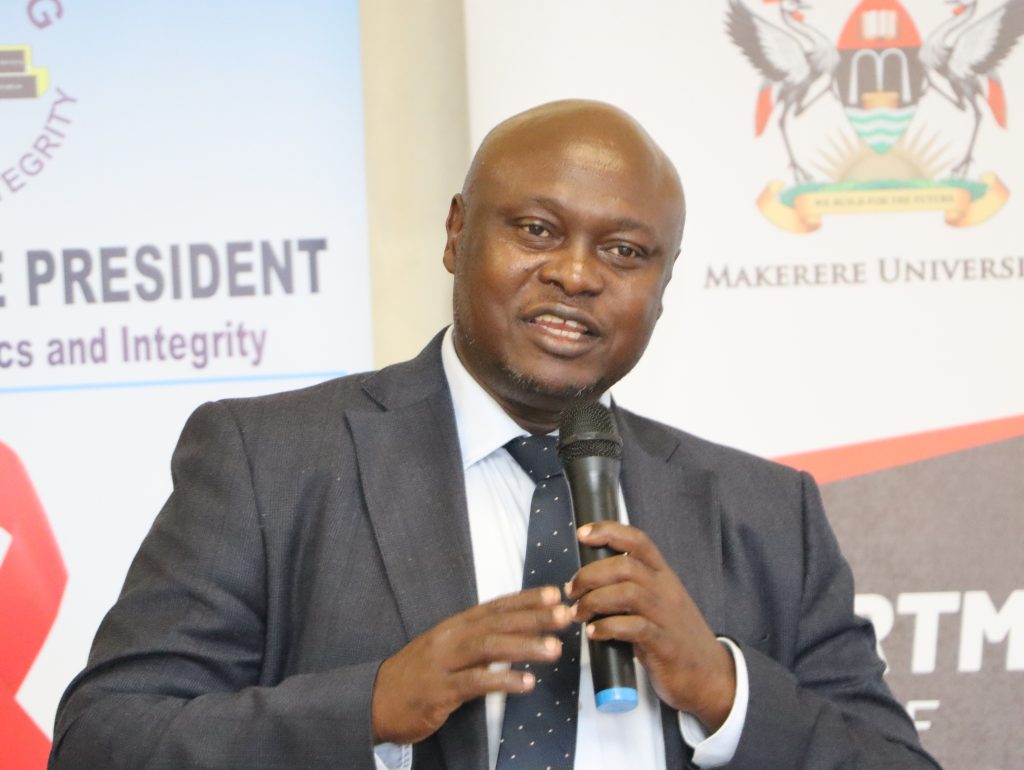
Prof. Awich further linked individual ethics to national governance, noting that good governance stems from ethical conduct at the personal and family levels. “Whatever we practice at the individual level resonates with what we do at the societal level. When we preserve family values, we preserve the values of the nation,” he emphasized.
He thanked the Ministry of Ethics and Integrity for its continued collaboration with Makerere University in promoting moral values, integrity, and accountability. He commended ministry officials including Hon. Dr. James Nsaba Buturo, Joel Wanjala, and Rev. Canon Aaron for dedicating their time to engage with students throughout the event.
He praised Makerere students for their enthusiasm and discipline during the ethics and human rights activities, describing them as “a very good cohort eager to learn beyond the classroom.”
Assoc. Prof. Awich concluded the event by officially declaring the 2024 Global Ethics Day celebrations closed, urging participants to apply the lessons learned in their daily lives and future careers.

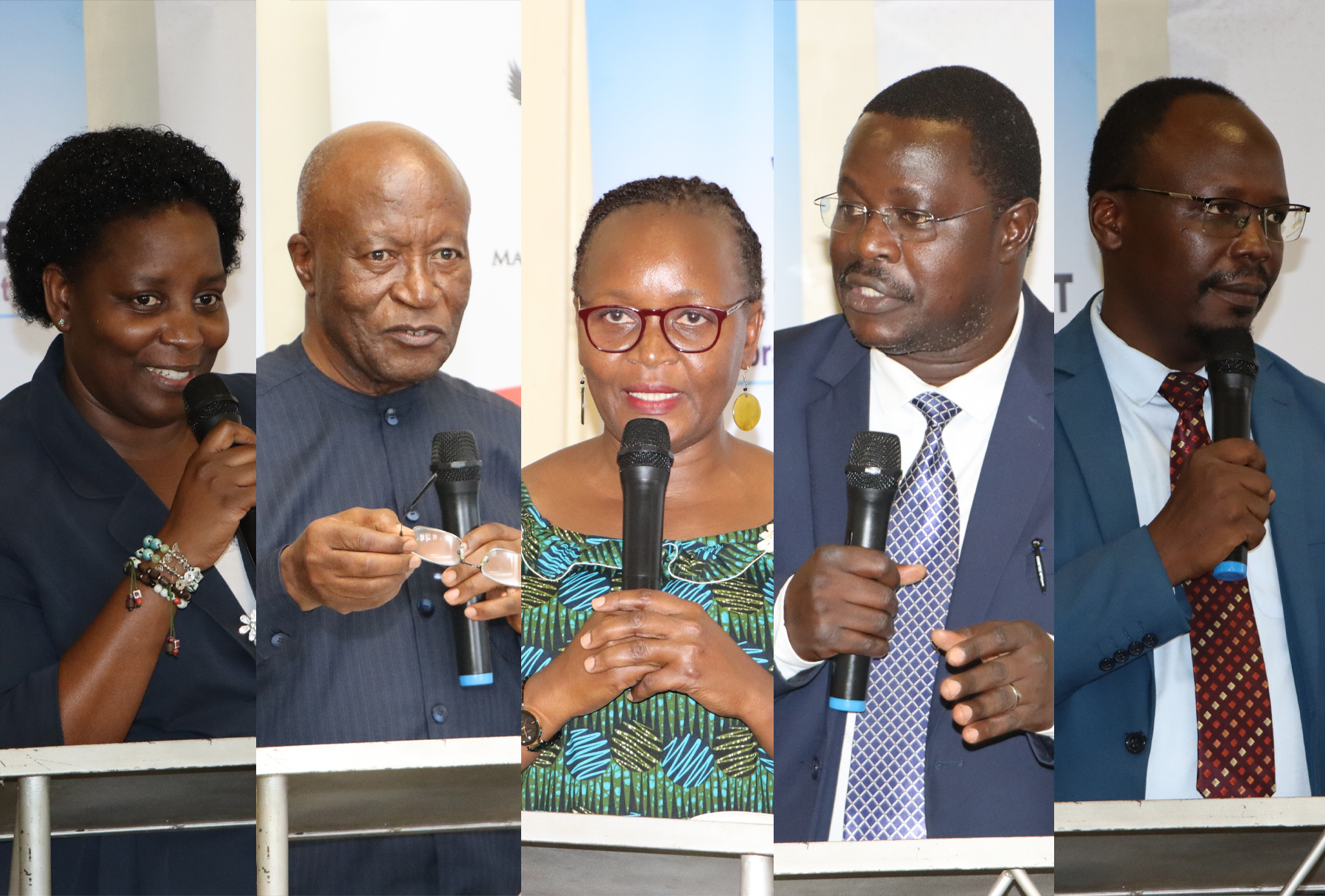
Interesting and educative sessions.thanks to the organizing committee.